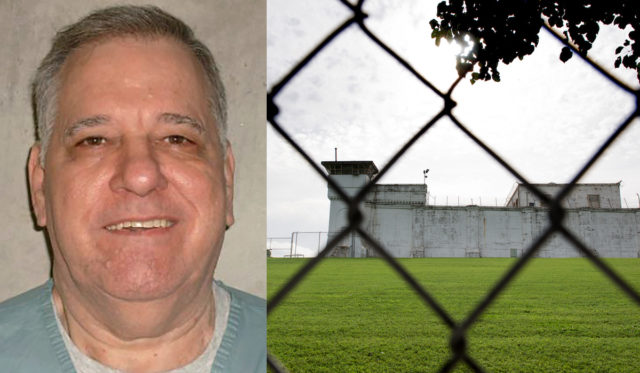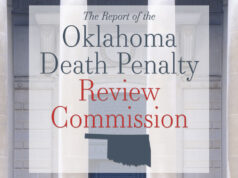

(Update: This post was updated at 11:08 a.m. on Thursday, Dec. 9, 2022, to include information from the post-execution press conference.)
Bigler Jobe Stouffer II was put to death by lethal injection at 10:16 a.m. today at the Oklahoma State Penitentiary in McAlester.
At a press conference afterward, Scott Crow, director of the Oklahoma Department of Corrections, said the execution had proceeded without complication.
Associated Press reporter Sean Murphy, who served as a media witness for the execution, said Stouffer’s last words were “My request is that my father forgive them. Thank You.”
Afterward, with the microphone into the viewing chamber turned off, Stouffer talked and laughed with his pastor, according to media witnesses.
Stouffer, 79, was convicted of a 1985 shooting that killed Putnam City Schools teacher Linda Reaves and wounded her boyfriend, Oklahoma City homebuilder Douglas Scott Ivens. He maintained his innocence.
On Nov. 17, the Oklahoma Pardon and Parole Board voted 3-2 to recommend Stouffer’s death sentence be commuted to life without the possibility of parole. Board members stated they believed Stouffer to be guilty but said they were concerned, at the time, about the state’s execution protocol.
Oklahoma Gov. Kevin Stitt rejected the board’s recommendation for Stouffer.
Stouffer told The Frontier on Wednesday that he was “pleased” Stitt had rejected the board’s recommendation.
“To me, life without (parole) is worse than the death penalty,” he said.
Rodney Thompson, a cousin of Reaves, said at the press conference that Reaves’ family extended their “deepest gratitude” to Stitt, Oklahoma Attorney General John O’Connor and all the prosecutors and investigators involved in the case.
“To see truth prevail through the various falsehoods and smokescreens that surfaced and a tribute to justice done,” he said.
Judge denied stay of execution
Judge Stephen Friot, of the U.S. District Court for the Western District of Oklahoma, denied Stouffer’s requested stay of execution on Nov. 23.
Stouffer and his attorneys argued that his execution should have been halted because of questions about the constitutionality of Oklahoma’s lethal-injection protocol, particularly following the Oct. 28 execution of John Grant.
According to witnesses, Grant convulsed multiple times and vomited when injected with the first drug of the three-drug protocol. Scott Crow, the director of the Oklahoma Department of Corrections had previously said accounts of Grant’s death were “embellished.”
The state’s execution methods have been the subject of an ongoing lawsuit brought by a number of Oklahoma death row inmates following two botched executions in 2014 and 2015. Stouffer was not part of that lawsuit, but his lawyers argued he ought to be added to it and his execution put on hold until there is a ruling in the matter, which is scheduled for trial in February.
In a hearing for Stouffer’s appeal, anesthesiologist and gubernatorial candidate Ervin Yen spoke as a witness for the state. He also served as a paid expert witness for Grant’s execution.
According to News9, Yen told the court he believes Grant’s execution was “fast and smooth,” contradicting media reports.
Murphy, who witnessed both executions, said Stouffer did not did not exhibit any of the convulsive movements or vomiting that had occurred during Grant’s execution.
According to court documents, Friot also ruled that Stouffer would be permitted to have his spiritual advisor with him, “including the laying on of hands,” during the execution. Oklahoma generally allows religious advisors to witness executions through a window.
The appeal for a stay went to the U.S. Supreme Court Thursday morning and was denied.




















